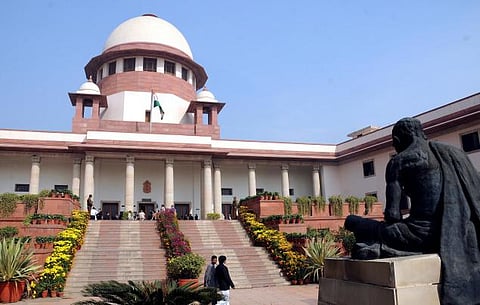

NEW DELHI: The Supreme Court on Thursday held as unconstitutional a 2004 law passed by the Punjab government terminating the Sutlej-Yamuna Link [SYL] canal water sharing agreement with neighbouring states.
"All the questions have been answered in the negative," a five-judge bench headed by Justice A R Dave said, pronouncing the court’s decision on a presidential reference.
The judgement makes it clear that the Punjab Termination of Agreements Act, 2004 is "unconstitutional" and rules that Punjab cannot take a "unilateral" decision to terminate the water sharing agreement with Haryana, Himachal Pradesh, Rajasthan, Jammu and Kashmir, Delhi and Chandigarh.
The bench, which also included judges P C Ghose, Shiva Kirti Singh, A K Goel and Amitava Roy, unanimously held that its response to all the five questions contained in the presidential reference is negative.
The judgement implies that the 2004 Act was not in consonance with a Supreme Court judgement of 2003 which mandated the construction of the SYL canal.
By that Act of 2004, enacted by the then Congress government off Capt Amarinder Singh, Punjab sought to nullify the Supreme Court verdict and proceeded to stop construction of the remaining part of the SYL canal.
Today’s judgement came in response to a presidential reference dating back to 2004 seeking legal clarity on the sharing of water from the SYL canal between the north Indian states.
A five-judge Constitution bench headed by Justice A R Dave, who is demitting office on Nov. 18, reserved its verdict on the matter on May 12 after the Centre maintained its earlier stand of 2004 that the states concerned should settle their dispute among themselves.
The Centre had said it was not taking sides in a dispute involving Punjab, Rajasthan, Himachal Pradesh, Haryana, Delhi and Jammu and Kashmir.
During the hearing of the case, the Punjab Assembly passed another law to return the land acquired for the construction of SYL canal. So the Haryana government approached the apex court and won a stay of the order.
The court had then also appointed the Union home secretary and Punjab's chief secretary and director-general of police [DGP] as the 'joint receivers' of land and other property meant for the SYL canal till the outcome of the judgement.
The Parkash Singh Badal government of Punjab had submitted that a fresh tribunal be set up to resolve all disputes with other states including Haryana on all aspects, which would also cover the riparian rights and the dwindling flow of water.
It had said a fresh tribunal was sought in 2003, about 18 months before the 2004 law, to review the 1981 Longowal Accord on river water-sharing in view of the depleting flow and other changed circumstances.
The water-sharing agreement was among Punjab, Haryana, Rajasthan, Himachal Pradesh, Delhi, Chandigarh and Jammu and Kashmir.